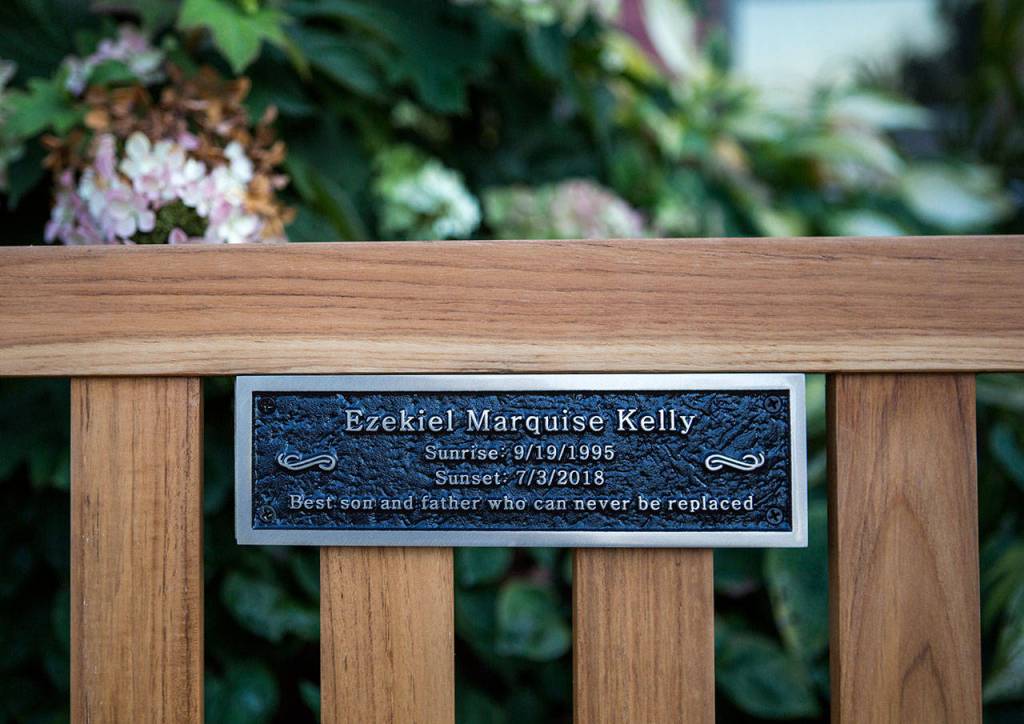Scarred by Mukilteo murder, a family expresses hope, thanks
Published 1:30 am Monday, September 30, 2019











MUKILTEO — On the last day of his life, Ezekiel Kelly called his mother. She had just clocked into work and stepped away from her phone.
On a voice mail he told her he was in a safe place and that he loved her. It was his answer to a phrase she’d use often with him: “Make sure you’re in a good environment, and a good, safe place.”
There seemed to be no cause for alarm.
Hours later on July 3, 2018, a person walking a dog found his body at an abandoned house in Mukilteo.
Kelly, 22, of Everett, had no ID on him. At the time, there was no obvious motive for the killing. Two men had abducted him, stabbed him more than two dozen times and shot him to death, the second in a pair of torture murders led by Anthony Hernandez-Cano.
At a ceremony Saturday in the Rosehill Community Center in Mukilteo, the Kelly family expressed their gratitude to the detectives who not only solved the crimes, but treated their family with compassion.
“This could happen to anybody, regardless,” said his mother, LaTonage Kelly. “Some people say, ‘Oh, that’s just gang-banging stuff.’ No, Ezekiel is a good person, a good loving person.”
Ezekiel spent his early years in Oklahoma and Texas, in a Christian household. His father, Elijah III, now a retired welder, said he was named for the vision God showed to the prophet in scripture.
Around kindergarten, Ezekiel could identify letters of the alphabet in sequence, but struggled to recognize them on their own. He was diagnosed with autism, and sensory issues made it hard for him to focus in large classrooms. His family moved to Pierce County. He started to play sports — soccer and basketball — to burn off a bit of his 8- and 9-year-old energy.
“We realized sports wasn’t killing the energy, it was just making him more energetic,” she said.
Technology came naturally to him. If his parents had trouble with a computer or phone, he could usually repair it. Once around age 16, a storm knocked out his grandfather’s TV signal. Ezekiel fixed the wiring.
His first name was difficult for a cousin to say, so he started going by Ezzy, pronounced “easy.” Or else just E. He worked fast-food jobs at Long John Silver’s and McDonald’s, never for long because of his condition, his parents said. At times he felt he didn’t fit in. To those who didn’t know him, his autism was invisible.
“People may notice it as they get to talking with him,” his mom said. “He wanted people to like him for him. … And he made friends. He didn’t make no enemies.”
In the mornings, he attended Stadium High School for computer classes, and in the afternoon he would return to his regular high school, Mt. Tahoma.
He named his daughter Elaina Marie, so she’d have the same initials as Ezekiel Maurice.
The Kellys moved to Everett about three years ago. Ezekiel applied for a robotics program at Bellevue Community College in summer 2018.
One day in early July, he didn’t come home. His parents went to police to report him as missing. As they waited at the station, detectives got results of fingerprint tests on the body in Mukilteo. They told LaTonage and Elijah Kelly that their son had been “involved in a homicide.”
“Then everything else just — just went away,” his mother said. “It was just a lot of anger.”
And many questions.
“Right off the bat, I wanted to know where Ezekiel was shot at, the location, how many times,” she said. “I wanted to know the major details of it, so I could at least prepare myself for it. This was just a huge nightmare, and we’re still walking through it.”
LaTonage Kelly knew she’d be getting those same questions from family and friends down south. Police told her as much as they could, and as much as they felt she could handle in that moment. In the months that followed, police kept her abreast of the progress in the case, answering phone calls, returning texts, and sitting down with them for meetings.
“They gave us all their 100 percent attention, and we appreciate that, because there’s so much going on with African-Americans with the police nowadays,” Kelly said. “We didn’t have that experience. Whatever they needed from us, we had it. Whatever we needed from them, they gave it to us.”
Over time they learned Hernandez-Cano had accused the first victim Mohamad Adan, 21, of “snitching” on him for violating a no-contact order. Later someone told him it was really Kelly who reported him.
He stabbed Kelly many times, then handed a pistol to his friend Hassani Hassani and told him to shoot. He obeyed, and pulled the trigger three times.
In both cases, the same car was driven to the crime scenes. It belonged to Hernandez-Cano’s girlfriend, Lendsay Meza. Security cameras captured images of the car, and that led police to the group. Hernandez-Cano admitted to both killings. He’s serving a life sentence for two counts of aggravated murder.
Meza is still awaiting trial. She’s charged with driving to and from both murder scenes.
Hassani is serving a 35-year sentence. He told police he did it because he wanted to be cool and tough.
“You do stuff like that for what?” Kelly’s mother said. “For what? Just to be in the game, participating? Just so that you’re tough? So that the other one’s tough? But why? Because now your family has to go around carrying the shame and guilt.”
Only God has constrained them from lashing out, Kelly’s father said. Instead they’ve tried to forgive.
“It’s not an eye for an eye, like the world would do,” Elijah Kelly said. “You have to forgive people. As a Christian, you have to forgive. If you don’t, you won’t be forgiven.”
LaTonage Kelly does not want to hold that bitterness inside her, either. Healing has been slow and painful. A couple times in the past year, Ezekiel’s daughter told her mother she wants to see her daddy. Once she’s older, someone will have to explain the truth. For now, they’ve told her he turned into a butterfly.
“It’s not easy,” LaTonage Kelly said. “It’s a day-by-day process. At first it was a second, a minute, an hour without crying. I would go to work just cry. Cry, cry, cry, cry, cry. Go home crying, and drive to work crying. But truly, there is hope.”
The loss of her son has made her want to reach out to people, to help others who have gone through this kind of trauma. It has brought her closer to the mother of her granddaughter. They talk over video chats. And on Saturday at the Mukilteo community center, the Kellys cooked macaroni and cheese for the team of detectives who investigated the case. On the wall a projector played photos of Kelly, in a Seahawks beanie, or a purple hoodie, or a red graduation cap-and-gown. Ezekiel’s mother gave brief speeches and handed over two glass plaques to the detectives.
Outside on the lawn, a bench with a view of the ocean was dedicated in Ezekiel Kelly’s honor.
After he died, his parents came across a drawing of flowers he’d made for his daughter. Ezekiel could really draw, his father said. His daughter loves to draw, too. She’s 4.
“We send her little papers and stuff,” LaTonage said. “She has his energy, his characteristics, his little facial expressions. It’s like when you see her, you see him, and everything she does, you’re looking right at him.”
Caleb Hutton: 425-339-3454; chutton@heraldnet.com. Twitter: @snocaleb.















